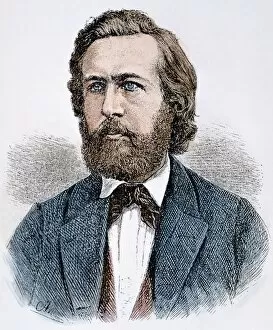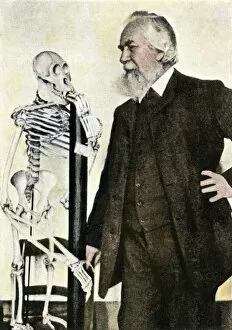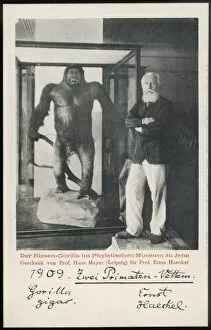Haeckel Collection (#3)
"Haeckel: Exploring the Wonders of Nature Through Art and Science" Step into the captivating world of Ernst Haeckel
For sale as Licensed Images
Choose your image, Select your licence and Download the media
"Haeckel: Exploring the Wonders of Nature Through Art and Science" Step into the captivating world of Ernst Haeckel, a renowned German biologist and artist whose work revolutionized our understanding of the natural world. In 1894, Haeckel unveiled his mesmerizing "Art of Diatom algae, " showcasing the intricate beauty hidden within these microscopic organisms. Delving further into evolution, Haeckel introduced us to Pithecanthropus, an ape man crop that challenged conventional beliefs about human origins in 1909. His thought-provoking cartoon featuring Darwin, apes, and himself ignited discussions on our shared ancestry. Beyond evolutionary studies, Haeckel's fascination with nature extended to Basidiomycota - filamentous fungi that thrive in diverse ecosystems. He meticulously studied their forms and patterns to unravel their secrets. In his groundbreaking masterpiece "Pedigree of Man, " Haeckel traced humanity's lineage through time immemorial. This awe-inspiring illustration captured the essence of our interconnectedness with all living beings. Venturing into botanical wonders, Haeckel explored Nepenthes gymnamphora pitcher plant - a carnivorous marvel that lures unsuspecting prey into its deadly embrace. His detailed observations shed light on this extraordinary adaptation for survival. Hailing from Acanthophracta radiolarians to Nudibranchia sea slugs and Ctenophora comb jellies - Haeckel unraveled the mysteries dwelling beneath ocean depths. These enchanting creatures fascinated him as he sought to unveil their hidden stories through artistry and scientific inquiry. In 1886, a French copy of Haeckel's tree-of-life diagram emerged; it depicted life's diversity branching out like delicate tendrils across time and space—a testament to his enduring influence on evolutionary biology. Ernst it also paid homage to Charles Darwin, his intellectual predecessor.












